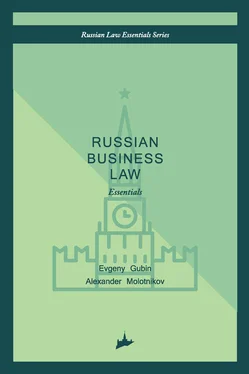Evgeny Gubin - Russian business law - the essentials
Здесь есть возможность читать онлайн «Evgeny Gubin - Russian business law - the essentials» — ознакомительный отрывок электронной книги совершенно бесплатно, а после прочтения отрывка купить полную версию. В некоторых случаях можно слушать аудио, скачать через торрент в формате fb2 и присутствует краткое содержание. Город: Moscow, Год выпуска: 2016, ISBN: 2016, Жанр: foreign_language, Юриспруденция, popular_business, на английском языке. Описание произведения, (предисловие) а так же отзывы посетителей доступны на портале библиотеки ЛибКат.
- Название:Russian business law: the essentials
- Автор:
- Жанр:
- Год:2016
- Город:Moscow
- ISBN:978-5-9904334-9-6
- Рейтинг книги:3 / 5. Голосов: 1
-
Избранное:Добавить в избранное
- Отзывы:
-
Ваша оценка:
- 60
- 1
- 2
- 3
- 4
- 5
Russian business law: the essentials: краткое содержание, описание и аннотация
Предлагаем к чтению аннотацию, описание, краткое содержание или предисловие (зависит от того, что написал сам автор книги «Russian business law: the essentials»). Если вы не нашли необходимую информацию о книге — напишите в комментариях, мы постараемся отыскать её.
Russian business law: the essentials — читать онлайн ознакомительный отрывок
Ниже представлен текст книги, разбитый по страницам. Система сохранения места последней прочитанной страницы, позволяет с удобством читать онлайн бесплатно книгу «Russian business law: the essentials», без необходимости каждый раз заново искать на чём Вы остановились. Поставьте закладку, и сможете в любой момент перейти на страницу, на которой закончили чтение.
Интервал:
Закладка:
6.2.3. Acts of the Highest Official of the Subject of Federation
The highest official is the head of the subject of the federation. In Moscow, the highest official is the mayor of Moscow. The legal acts adopted by the Mayor of Moscow (decrees) can not contradict the charter and the laws of the city of Moscow (part 8 of Article 41 of the Charter of the city of Moscow).
6.2.4. Acts of Other Public Authorities of the Subject of Federation
Other public authorities of subjects of the federation are the highest executive body of the public authority, as well as various departments, commissions, and similar bodies.
In Moscow, the highest executive body of the power is the Government of Moscow. Decisions and orders of the Government of Moscow can also affect the interests of businesses.
Other bodies of the city of Moscow, such as the Department of Trade and Services, can also adopt acts, which are significant for representatives of businesses.
Finally, in the administrative districts and areas of the city of Moscow, territorial authorities of executive power are formed – this includes the prefecture of administrative districts and councils of areas, which also adopt acts that are obligatory for execution.
7. The Municipal Acts Regulating Entrepreneurial Activities
Acts at the municipal level in the Russian Federation are also built in a certain hierarchy. The charter of municipality stands at the top of the system, the acts of the representative body (local parliament) are located a step below, the acts of the head of municipality are another step below, and finally the acts of other authorities are at the lowest level.
8. Customs
A special source of law in Russia is customs. The custom "is a rule of conduct which has taken shape and is widely applied in a certain sphere of business and other activities, and which has not been stipulated by legislation, regardless of whether it has or has not been fixed in any one document," (Clause 1 of Article 5 of the Civil Code of the RF). The customs cannot contradict the norms of legislation or provisions of contracts (Clause 2 of Article 5 of the Civil Code of the RF). In Russia, customs are sources of civil law only.
9. The Judicial Practice
The legal system of the Russian Federation belongs to the Continental (Roman-German) type. One of the consequences of this system is that there are no judicial precedents in Russia: the courts are obliged to make decisions, being guided by laws and other legal acts, but not by other judicial decisions. The courts can not create new legal norms.
In practice, one should consider the following:
i) The generalization of judicial practice
The highest instance of the judicial system of Russia is the Supreme Court of the RF. [22] The Supreme Court of Arbitration of the RF, which previously headed the system of arbitration courts, became part of the Supreme Court of the RF. For details, please, see Chapter on Litigation, Arbitration and Other Means of Legal Protection.
The Supreme Court of the RF is given the right to make explanations to inferior courts, concerning judicial practice on matters, with the basis of study and generalization (Clause 1 part 7 of Article 2 of FCL on Supreme Court of the RF). Such explanations are given in the decisions of the Plenum of the Supreme Court of the RF, [23] The Plenum of the Supreme Court of the RF is a part of the Supreme Court of the RF.
and informational letters of the Supreme Court of the RF.
In the decisions of its Plenum, the Supreme Court of the RF, expresses positions on the most important issues, as well as on those problems regarding which there were serious contradictions among inferior courts (for the purposes of correcting such contradictions and making the practice uniform).
Informational letters are descriptions of concrete cases; a short narrative of the court decisions made on the given cases, and the comments of the Supreme Court of the RF concerning whether the inferior court adjudicated the case correctly or not.
It should be noted that the Decisions of the Plenum of the Supreme Court of the RF, and the information letters of the Supreme Court of the RF, are the result of the generalization of judicial practice, and not the revision of the decision of the inferior court.
However, while interpreting a norm in the decisions of the Plenum the Supreme Court of the RF, it sometimes gives a meaning which is absolutely different from the one resulting from the literal interpretation of the writing.
Formally, the positions stated in the decisions of the Plenum of the Supreme Court of the RF and the information letters of the RF are not obligatory for other courts. However, in practice the situation is very different. The inferior courts strictly follow the decisions of the Supreme Court of the RF, therefore the specified acts have an obligatory character. Thus, the Supreme Court of the RF can actually change the meaning of this or that norm, and sometimes change it quite substantially.
ii) References to the court decisions on analogue cases
While preparing a position on a specific case, it is recommended to refer (whenever possible) to the court decisions on analogue cases. The judges listen to such arguments, and even in the final decision on the case, they sometimes indicate how a similar dispute was previously solved by another court. Moreover, the references should be made to the decisions of the Supreme Court of the RF, the courts of the subjects, and the arbitration courts of cessation. The court decisions, standing below, are seldom cited as an example. Practice shows that the party, whose position is supported with the court decisions on analogue cases, has a much better chance of winning the case.
Thus, while studying any aspect, one should analyze not only the federal laws and other legal acts, but also the acts of the courts on relevant issues.
Evgeny Arkhipov [24] Lomonosov Moscow State University, PhD candidate, LL. B. 2014.
Chapter 2 – Business Association Forms
1. Persons Conducting Entrepreneurial Activities
1.1. Entrepreneurial Activities
The Civil Code of the Russian Federation includes the following definition of entrepreneurial activities: "independent activity, performed at one's own risk, aimed at systematically deriving a profit from the use of the property, the sale of commodities, the performance of work, or the rendering of services by the persons, registered in this capacity in conformity with the law-established procedure," (Clause 1 of Article 2 of the CC of the RF). Judicial practice clarifies the given definition. Thus, on February 24, 2004 Constitutional Court of the Russian Federation rendered decision No. 3-P on the matter of the verification of the constitutionality of separate provisions of Articles 74 and 77 of the Federal Law on Joint Stock Companies, regulating the consolidation order of the placed stocks of a joint stock company and redemption of fractional shares. This decision was related to the complaints of citizens and the “Cadet Establishment” company, and as per the inquiry of Oktyaberski District Court of the city of Penza, specified the following:
The right to free use of one’s abilities and property for entrepreneurial and other economic activities, not forbidden by law, serves as a basis for constitutional legal status of the participants of business companies, in particular of shareholders of joint stock companies being legal entities, as well as natural persons, including those who are not entrepreneurs, and who exercise their rights through holding stocks, certifying the rights to obligation of its owners, towards the joint stock company.
Читать дальшеИнтервал:
Закладка:
Похожие книги на «Russian business law: the essentials»
Представляем Вашему вниманию похожие книги на «Russian business law: the essentials» списком для выбора. Мы отобрали схожую по названию и смыслу литературу в надежде предоставить читателям больше вариантов отыскать новые, интересные, ещё непрочитанные произведения.
Обсуждение, отзывы о книге «Russian business law: the essentials» и просто собственные мнения читателей. Оставьте ваши комментарии, напишите, что Вы думаете о произведении, его смысле или главных героях. Укажите что конкретно понравилось, а что нет, и почему Вы так считаете.












